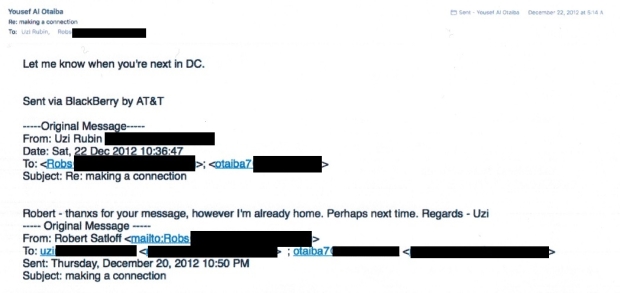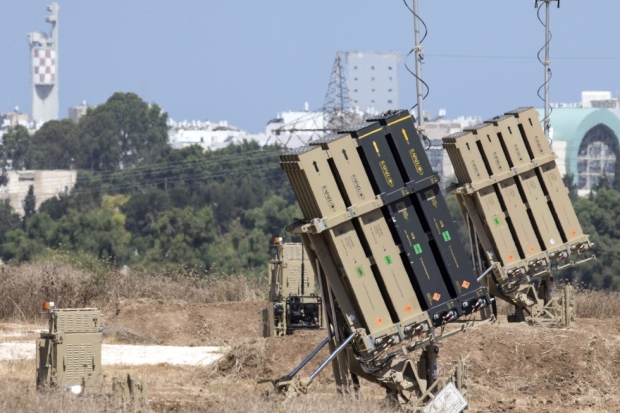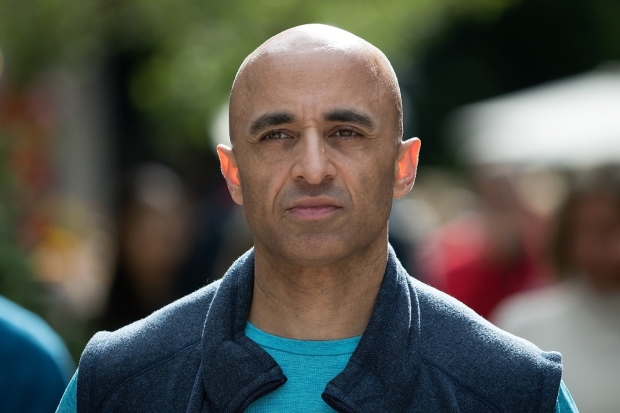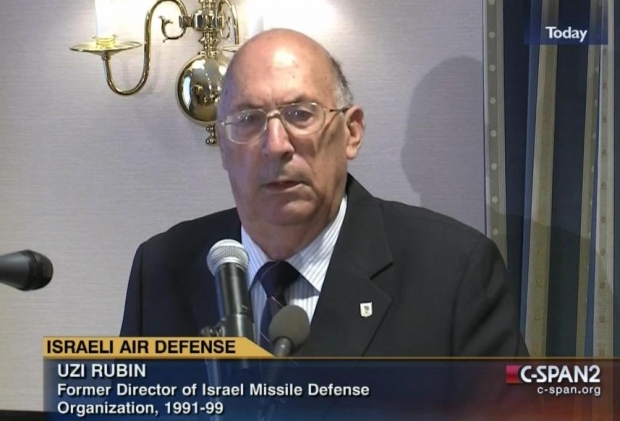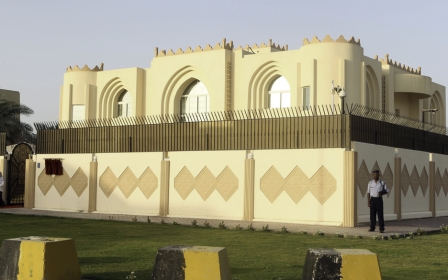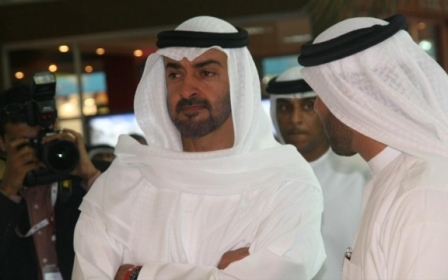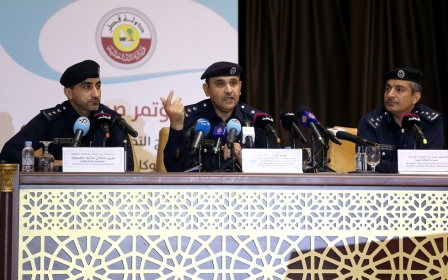EXCLUSIVE: UAE sought Gaza war assessment from 'father' of Israel's Iron Dome
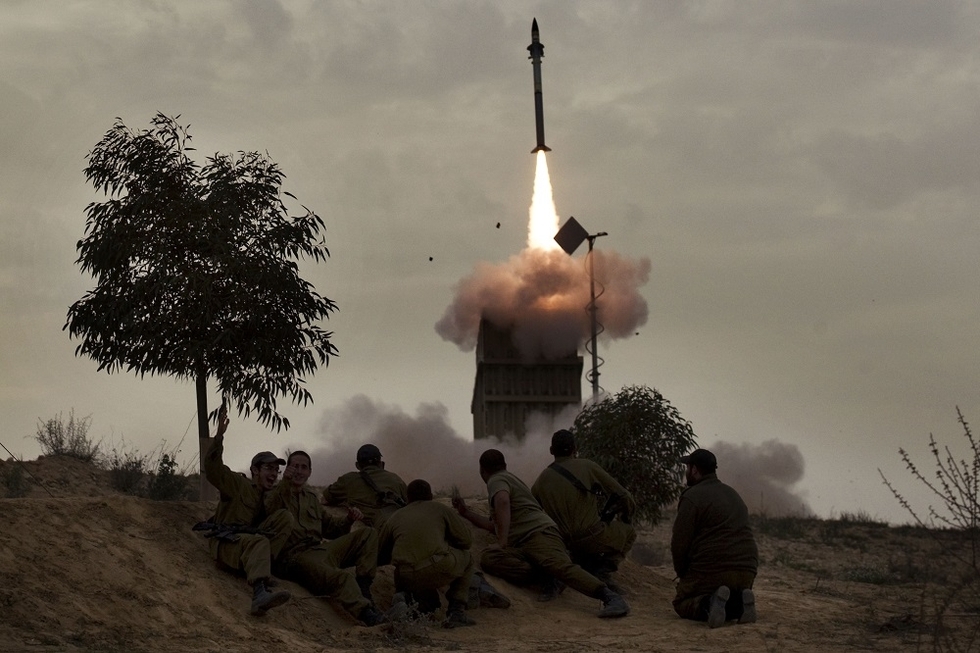
The UAE's top diplomat in America sought a battle-damage assessment of Israel's 2012 eight-day war on Gaza from the "father" of Israel's Iron Dome missile defence system, according to leaked emails obtained by Middle East Eye.
Yousef Otaiba was introduced to Uzi Rubin by a senior pro-Israel analyst in Washington, although it was unclear if the two have ever met. Still, the emails, obtained by the GlobalLeaks hacking group, show growing military and diplomatic ties between the Gulf kingdom and Israel.
Robert Satloff, the executive director of a Washington-based pro-Israel think-tank, wrote to Yousef Otaiba on 19 December 2012 to suggest a meeting with Uzi Rubin, a former Israeli brigadier general who led the Israel government's missile defence organisation. Within three days, Rubin and Otaiba were emailing directly.
The exchange came a month after Israel's operation Pillar of Defence against targets in Gaza, which according to UN figures killed 174 Palestinians, 107 of them civilians, including 33 children. There were six Israelis casualties, two of whom were soldiers.
I would be interested in hearing how it did in Gaza recently
- Yousef Otaiba, UAE ambassador
Rubin visited Washington to praise the success of Israel's Iron Dome system in defending against missiles fired from Gaza during the eight-day war. He told a forum of guests: "In strategic terms, the recent conflict was largely a 'push-button' war."
Satloff, who hosted Rubin, wrote afterwards to Otaiba: "You were on my mind yesterday when I heard a compelling presentation by the father of Israel's Iron Dome anti-missile system, Uzi Rubin.
"He closed his presentation with comments about the applicability of the system to Gulf states facing Iranian missiles. I assume your side has heard from him and his colleagues directly; if that's not the case, I can certainly set something up."
Otaiba replied: "I have not met with Uzi. I would be interested in hearing how it did in Gaza recently. I read the press commentary on its performance but would be interested to hear more specifically."
'Let me know when you're in DC'
Satloff then sought permission to introduce Rubin to enable a future meeting, to which Otaiba agreed. The communications appeared to quickly pay off - in an email direct to Rubin on 22 December 2012, Otaiba said: "Let me know when you're next in DC."
Rubin replied that he had already returned home, and signed off: "Perhaps next time. Regards - Uzi."
Satloff did not deny his email exchange with Otaiba. In an email to MEE, he said: "I do not know if the people in question ever met but I do not believe the specific meeting to which you refer ever happened.
"And by the way, I don't 'broker' meetings. The Washington Institute, like other research organisations/think-tanks, regularly arranges meetings... that bring together all sorts of people, from all range of governments and backgrounds, in a wide variety of formats."
The contacts between Otaiba and Rubin are among a number of conversations captured between the diplomat and Satloff, who has long served the Washington Institute for Near East Policy (WINEP), a spinoff of the powerful American Israel Public Affairs Committee (AIPAC) pressure group whose analysts and scholars are almost exclusively pro-Israel.
Satloff opened his note by thanking the UAE ambassador for "the generous new year's gift", without specifying what he had been given.
In his reply to MEE, Satloff said he did not recall what the gift was. He stated his institute's policy states staff can accept personal gifts from foreign governments worth less than $20.
Dinner with the ambassador
Satloff solicited Otaiba in February 2012 for an exclusive dinner, that he can feel free to pay for: "This is a bit presumptuous but would consider hosting our most important lay leaders - our board of directors - for dinner at your home? They (about 15 or so) will be in town for a meeting... on the evening of Tuesday, 6 March."
Sensing opportunity, Otaiba replied: "That's a great idea. Happy to host such a powerful group on such a critical topic. My only request is we keep it off the record and discreet."
WINEP's board includes such figures as Peter Lowy, the executive director of Westfield and son of Australian billionaire and right-wing Israel supporter Frank Lowy.
It also includes its founder, Barbi Weinberg, a former AIPAC vice president. Weinberg, along with AIPAC's then-deputy director of research Martin Indyk, helped create WINEP as a separate entity in the 1980s to offer distance for their pro-Israeli policy ideas, a recognition of the "image problem" encountered by authoring US policy ideas on AIPAC letterhead.
After the March 2012 dinner, Satloff wrote to Otaiba to inform him "you earned a houseful of friends last night", and heaped praise on the UAE ambassador for his "striking candour" with WINEP's board, "opening" their "eyes to the real anxiety UAE has re: Iran".
Otaiba assured Satloff: "I truly enjoyed the conversation. My main message was the alignment of Israel and many of the Arab countries when it comes to Iran."
Satloff would not disclose who attended the dinner, but told MEE such events with a "broad range of US and foreign officials" are a "regular occurrence" and that to "suggest or imply otherwise underscores the conspiratorial, rather than newsworthy tenor of your inquiry".
High-level interactions
Satloff has continued to seek more engagements with his Emirati friend. Since 1996, WINEP has hosted a range of Israeli military and intelligence officers as visiting fellows in its Washington offices, partly to influence Washington's debate on matters including Palestine and Iran.
Satloff asked Otaiba to consider allowing UAE officials to work at WINEP as visiting fellows, a sign of how closely regarded the Gulf country has become in the eyes of America's hawkish pro-Israel community.
Otaiba had earlier promised Satloff to "look into this one and see how our military folks respond".
In his reply to MEE, Satloff said he had made similar approaches to various governments, hosting Israeli, Jordanian and Turkish officers, and that WINEP had hosted a diplomat from the French foreign ministry as well as US diplomats and other government officials. He added: “Regrettably, we have not yet had the opportunity to host an Emirati officer.”
Otaiba later proposed to help WINEP "find some Emirati and perhaps non-Emirati speakers to discuss MB and radicalisation in the region", referring to the Muslim Brotherhood, whose affiliates have won popular elections in Egypt, Tunisia, Turkey and Kuwait and which the UAE and Israel together demonise as threats.
We have never solicited or accepted any donation from any UAE source
- Robert Satloff, Washington Institute for Near East Policy
Otaiba also wrote Satloff to give WINEP high marks for an article by David Pollock, who wrote a January 2016 piece in "defence of the US-Saudi relationship".
"I wanted to let you know," wrote Otaiba. "I think the piece [by] David Pollock on Saudi is arguably the best analysis I've seen so far... try to find a way to get it published in a mainstream publication because this piece needs as much exposure as possible!"
By return Satloff lamented trying "all the usual mainstream outlets but were rejected", which he saw as "a sad sign of the times".
Otaiba, whose Washington connections apparently far exceed think-tanks, offered to help, although Satloff declined: "Not even Politico? I can pull some strings there if needed," the envoy wrote.
In his reply to MEE, Satloff wrote: "By longstanding policy, the Washington Institute does not solicit or accept donations from any foreign source - individual, corporation, government or foundation. We rely solely on financial support from American sources. Specifically, we have never solicited or accepted any donation from any UAE source."
UAE and Israel grow closer
The UAE does not have official diplomatic relations with Israel. However, in November 2015, the government of Abu Dhabi allowed Israel to establish a diplomatic office for the International Renewable Energy Agency (IRENA), based in the Emirati capital, though Israeli officials stressed it was to be accredited solely to IRENA, an intergovernmental organisation.
MEE and Haaretz reported in 2015 that a private jet was flying at least twice a week between Tel Aviv and Abu Dhabi. A 2012 report by the French Intelligence Online website said AGT International had signed a contract worth $800m to provide Abu Dhabi's Critical National Infrastructure Authority with "surveillance cameras, electronic fences and sensors to monitor strategic infrastructure and oil fields".
The corporate intelligence website described AGT's owner Mati Kochavi as "the Israeli businessman most active in Abu Dhabi".
Politically, convergence on policy matters between the UAE and Israel has led to increased interactions as the Emirates, along with Saudi Arabia, adopt more aggressive postures against neighbouring Iran, which Israel also considers a top threat.
Still, open relations with Israel would provoke outrage among Palestinian factions, many of which maintain that normalisation of diplomatic ties between Israel and Arab and Muslim countries can only occur after Palestinians are allowed to live free in a state of their own.
This article is available in French on Middle East Eye French edition.
New MEE newsletter: Jerusalem Dispatch
Sign up to get the latest insights and analysis on Israel-Palestine, alongside Turkey Unpacked and other MEE newsletters
Middle East Eye delivers independent and unrivalled coverage and analysis of the Middle East, North Africa and beyond. To learn more about republishing this content and the associated fees, please fill out this form. More about MEE can be found here.


